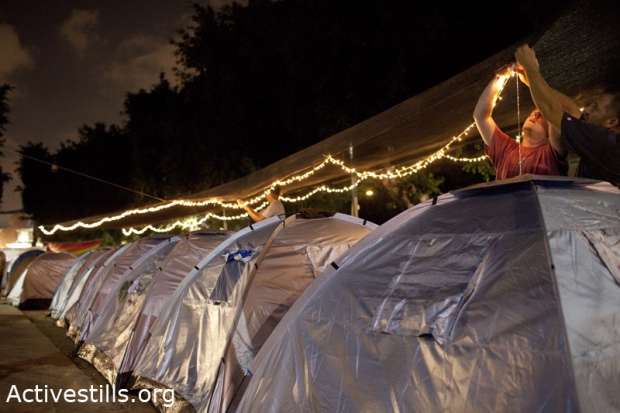The protest that sprang up out of the blue against rising rent costs, not started by or backed by any political power, is now described as the greatest challenge PM Netanyahu faces on the home front
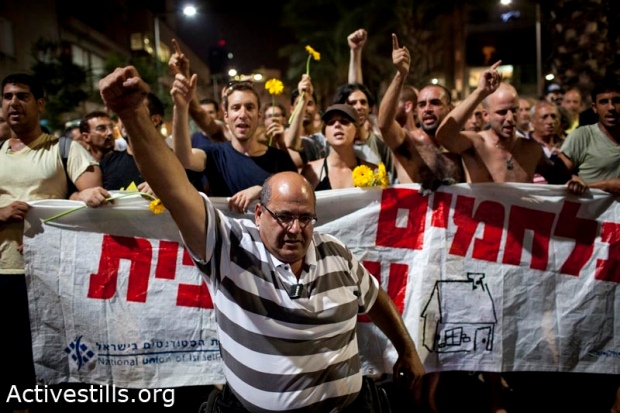
It happened almost overnight: Friday morning a week ago, walking near Habima Square in central Tel Aviv, I saw only a handful of tents, with no more than a few dozen Israelis who answered an internet call for an ongoing protest against rising rent costs. On Saturday evening the tents covered an entire block on Rothschild Boulevard, and protesters threw cottage cheese containers on the Likud HQ on nearby King George Street. A couple of days later, the tent protests came to dominate the news cycle.
Housing minister Ariel Attias (Shas) argued that the protesters were spoiled kids that refuse to leave the fashionable center of the country, but by Tuesday there were tents in Jerusalem, the southern city of Beer Sheva and as far north as Kiryat Shmona, near the Lebanon border (see a map of all the protests here). By Wednesday protesters tried to break into empty apartments in Tel Aviv and Jerusalem; the tents on Rothschild Boulevard stretched several blocks, all the way from Habimah Square to Shenkin Street, and marches and rallies were scheduled for the weekend. The Friday papers declared that Binyamin Netanyahu sees the tent protest as the greatest potential political threat to his governing coalition. Throughout the week the prime minister conducted ongoing meetings in attempts to bring the protest to an end.
So, what is this protest all about? Why now? And what could be its political implications? I will try to answers some of these questions in this piece.
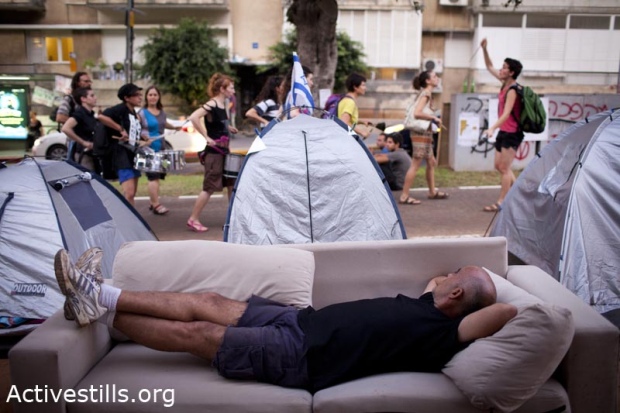
A well-known method used to estimate real estate cost is to divide the price of an asset by the average monthly salary. Dr. Danny Ben Shahar of the Technion Institute for Science in Haifa, estimated that the median Israeli family had to spend 50 full salaries for an average Israeli apartment in 1989. Two decades later, this figure nearly doubled – in 2011, buying an average apartment would cost the same family 90 full salaries. According to Dr. Ben Shahar, An average apartment in Tel Aviv – just an average one – is too expensive for 90 percent of the population, even if they can spread their mortgage over 30 years.
Dr. Ben Shahar presented his findings in a panel at Tel Aviv University a few months ago. He told his listeners that the real estate market is “a social time-bomb.” I spoke with Dr. Ben Shahar a few days a go for a piece I did for an Israeli magazine; he admitted that he didn’t expect things to happen so fast. “If this problem isn’t taken care of, what you see now is just the beginning.”
The real estate crisis in Israel is entirely different from the one which led to the market crash in the United States. To put it simply: Apartments, especially in the cities, have become too expensive for most Israelis. Rent alone rose between 15 and 25 percent in all major cities in the last two years alone.
Readers from abroad who visited Tel Aviv or Jerusalem lately probably noticed that neither is a cheap city, and that they are becoming more expensive every year. Average rent in Tel Aviv is still lower than in Manhattan, San Francisco and London, but it’s already similar to the prices in Chicago, Atlanta and Barcelona, and it’s higher than in Berlin. The important figure is that salaries in Israel are much lower than in any of those cities. In relative terms, Israelis pay more for groceries, services and housing than in most countries in the West. Housing is the biggest expense of the average household, so that’s where the pressure is felt.
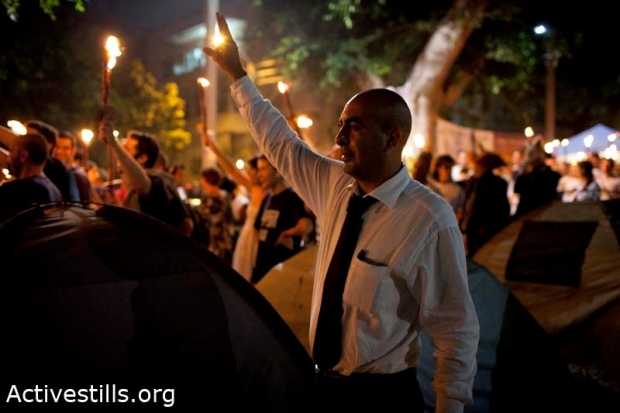
In the first half of the previous decade, Israel experienced a small scale economic crisis, a result of the second Intifada. The Finance Ministry, led by Silvan Shalom and later Binyamin Netanyahu (both from Likud) cut government expenses while lowering taxes for the more affluent Israelis. When the crisis ended, the best options for investment for those Israelis, and for money coming from abroad, were in the real estate market, especially in the cities.
Investors began buying apartments, driving prices up. Many of them were Jews – mostly from the United States and France. The richest of them didn’t even bother to rent out their assets to Israelis in their absence; they just wanted a house in Jerusalem or Tel Aviv. Such assets were considerably cheaper than in New York or Paris, and had special sentimental value for those Jews. The result is the now-infamous “ghost apartments,” occupied for only a few weeks each year. One luxury housing project in Jerusalem, overlooking the old city, is especially notorious for having no permanent tenants.
Young Israelis were angered by and resented this trend, and rants against “the rich Jews” became very common in the last few years. It was not surprising that a few days ago protesters in Jerusalem tried to break into some ghost apartments, ending up barricading themselves in the garden for a few hours.
All of this could have been similar to what happened in other large cities around the world – prices going up, investors coming in, locals and young people gradually moving out – if it weren’t for some unique factors in Israel, which complicate the situation: First and most important, Israeli cities have no efficient public transportation systems. Tel Aviv’s old bus service is especially notorious, and the privatization of a few of the busiest lines a few years ago seemed only to make things worse. Furthermore, buses don’t run overnight, and due to an old arrangement with the religious parties, there is no service on weekends and holidays either (except in Haifa). As for owning a car, commuting in the Dan Metropolitan Area (Greater Tel Aviv) is a nightmare, and parking is nowhere to be found. Students and shift workers have no option but trying to rent in the city center, where they can ride a bike or a scooter, or simply walk to work.
These problems have been known for some time now, but Israel has been governed for many years by neo-liberal governments, who did not encourage the construction of affordable housing – except in the West Bank, and in some occasions, for the ultra orthodox – and refused to invest in mass transportation projects. In fact, Netanyahu’s coalition has struck down no less than four legislation attempts concerning rent control; the Finance Minister was able to kill a housing ministry’s plan for housing subsidies, and the Interior Minister, on the advice of the government’s attorney, stopped attempts by municipalities (including Tel Aviv’s and Jerusalem’s) to encourage affordable housing projects, claiming they lacked legal basis.
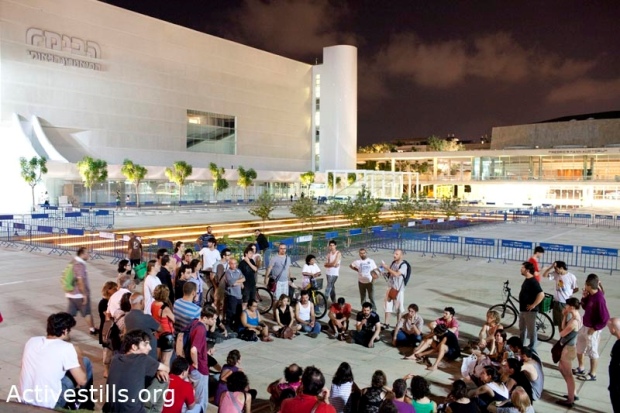
It’s been many years since Israel stopped being the welfare state its founding fathers dreamed of. While taxes remain much higher than in the America, government services have deteriorated and the cost of living continues to rise. Israel is at the top of the economical inequality index in the West, second only to the United States; Israelis work more hours than in most European economies, and they serve 2 to 3 years in the army, for which they don’t really get paid. In short, life is simply more difficult than in other places, and the safety nets Israel used to provide its citizens are disappearing. So while the government boasts about Israel’s excellent economic performance, more and more Israelis were finding it increasingly difficult to make ends meet.
The middle class unrest over such issues has been felt for some time now, but it went largely unnoticed, also because financial issues rarely make it to front pages in Israel. But recently, things started to change. Around three months ago, there was an attempt to start “a petrol march” to protest the rising gas prices, which didn’t result in much. After that there was the cottage cheese boycott, when tens of thousands of Israelis stopped buying the country’s most popular soft cheese, until the three large dairies were forced to reduce their prices. And then came the tents.
The tent protest is different from all the others for a few reasons: First, it’s an issue for which the government will find it difficult to present quick solutions. Second, it’s an ongoing protest: people sit in tents the entire day, talk to each other, plan more activities and draw attention from the media and ordinary Israelis, who come to visit the Rothschild Avenue Settlement by the thousands. But the most important thing is that this is an issue almost any Israeli can relate to.
There have been tent protests over housing issues in the past, but those behind them were usually lower-income families, and occasionally, Palestinians. Those are groups that the authorities have no problem dealing with. This protest is different: it is led by young Israelis in their twenties, most of them from the middle class. By now, they also have the students associations behind them. Prime Minister Netanyahu must remember with horror the long student strike of 1998. Although it failed to rock his coalition, this event marked the beginning of his decline in his first term as prime minister. And now the students are protesting again.
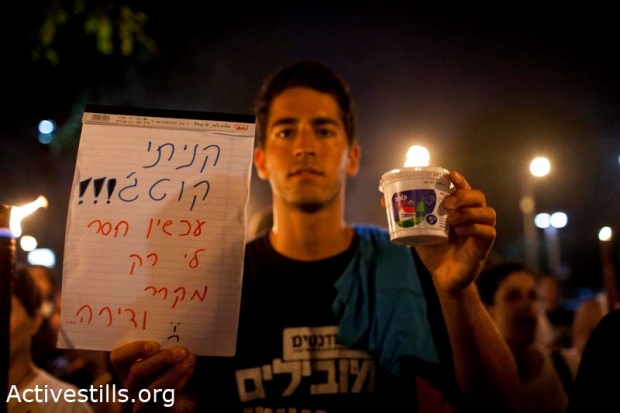
So, what political effects will the tent protests have? Looking at the polls published every few weeks in the weekend papers, one would notice that oddly enough, it seems that nothing has changed in Israeli politics in the last couple of years. If elections were held today, according to pollster, the result would be the same as it was two years ago, give or take a few seats. Netanyahu’s approval ratings are very stable as well, always within a few points of the 50 percent line. Not long ago, I wrote that there is no threat to Netanyahu in the political system – from left or right. Not much has changed since.
But there are undercurrents in politics as well, and for some time, once could definitely sense a certain anxiety amongst Israelis. It’s not only about the economy, nor is it about the occupation – seems that Israelis couldn’t care less about this particular issue – or the exchange of threats with Iran. I guess it’s all the above and a bit more. It’s the sense that there is no future for “ordinary Israelis” here. This is something which is hard to distinguish from the usual rants about what Israelis call “the matzav” (the situation), but nevertheless, I think this mood is undeniable, at least in certain circles.
So far, this Zeitgeist has resulted in people withdrawing from interest in politics. In other cases, Prime Minister Netanyahu and other right wing politicians have been able to manipulate fears and anxieties in their favor. The last wave of protest seems set to change that. While the protesters are refusing endorsement from political powers – even calling themselves non-political – they are clearly anti-government. More than anything, they seem to resent the entire current political establishment, and while this does not mean that they support the opposition, such feelings are more dangerous to the ruling parties.
As if to illustrate this point, Netanyahu’s supporters and rightwing movement have gradually stepped up their hostility to the tent protest, accusing it of being a leftwing operation, initiated and funded by the New Israel Fund and various other lefty groups. A front page story in the pro-Netanyahu tabloid Yisrael Hayom—the most widely read daily in Israel—claimed that “the Zionist Left” movement is behind the real-estate protest. Rightwing group Im Tirzu, who tried to co-op the struggle earlier this week and even sent representatives to visit the tents in Rothschild Boulevard, withdrew its support from the protest, accusing it of being run by the NIF and “various anarchist groups.” In this weekend’s papers, almost all of the rightwing pundits wrote pieces against the protest.
So far, these attacks haven’t hurt the protest, but some real challenges are emerging in the next few days. A planned demonstration on Saturday evening will give some indication of the public support for the protesters. On Sunday, Jerusalem’s municipality’s deadline to evacuate the tents from the city center—sources in the municipality claimed that their presence would hurt tourism—will arrive. Other municipalities are bound to follow with attempts to evacuate the tents, and they will be assisted by the inevitable fatigue of the protesters and the unbearable summer heat.
To sum it up, while it is one of the most important internal events in Israel in the last couple of years, I don’t see this protest driving votes to the left or to Kadima in the short run. Over a longer period of time, it will probably help the opposition to Netanyahu, from both right and left. Plus, the feeling of alienation and resentment from the old political power will increase the likelihood of outsiders entering politics and drawing support.
The protest might also have some indirect effect on the geo-political game. As I said, protesters couldn’t care less about the occupation or Iran right now, but social crises have this funny effect on politicians – they make them more active. I don’t think that Netanyahu or Barak will go so far as to attack Iran, for example, to divert attention from their problems at home, as some people have speculated (I hope they are not that crazy, and there is still considerable opposition in the security establishment for such a move). Still if the protest continues for a prolonged period, we should expect some “bold” moves from what has been a very passive government so far, to say the least.
As history can teach us, economic crises and social unrest tend to increase the bets in politics. They hand ammunition to everyone – creating opportunities for political change and reform, but also preparing the ground for the rise of rightwing demagogues and warmongers. And one should never forget that in the Middle East, the stakes are always high.

As one of my editors used to say: In this country, it’s all about real-estate. Every political controversy has to do with land, every social battle, and obviously, the Palestinian-Israeli conflict itself. If you understand real estate here, you understand it all.
————————-
For 972’s ongoing coverage of the Tent Protest, go here.


